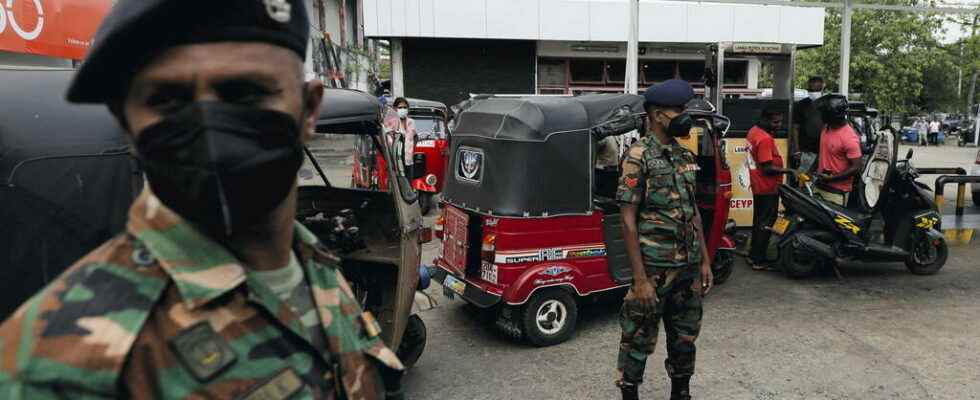Sri Lanka ordered the presence of soldiers at petrol stations on Tuesday March 22, after violent demonstrations in queues for fuel. Thousands of motorists are waiting at once to get supplies, while the country is going through its worst economic and financial crisis since its independence, which is also causing a shortage of kerosene, which is also necessary for cookers.
Authorities say soldiers were deployed after a busy street in Colombo was blocked for several hours on Monday by an enraged crowd by the shortage of gasoline and kerosene.
” Tempers flare as queues get longera senior defense official told AFP on condition of anonymity. A decision was taken last night to call in soldiers to back up the police, to discourage any unrest “, he continued.
A gathering of women blocked a bus carrying tourists to protest a shortage of kerosene needed to run their stoves, according to footage circulating on social media on Monday.
Military officials said soldiers were at the pumping stations of the state-owned Ceylon Petroleum Corp, which accounts for two-thirds of the retail fuel business.
The use of the army also comes after the murder of a motorcyclist, stabbed on Sunday March 20 by a driver while they were fighting over their place in a queue for gasoline in Nittambuwa, at the exit of Colombo.
Shipments blocked for lack of foreign currency to pay for imports
Oil and liquefied petroleum gas shipments are stuck in Colombo’s main port as importers fail to raise enough foreign currency to pay for them.
The Office of President Gotabaya Rajapaksa further announced an all political party summit to be held on Wednesday March 23 to discuss the economic crisis, but opposition groups have expressed their intention to boycott the meeting.
The island of 22 million people crosses its worst economic and financial crisis since its independence vis-à-vis Great Britain, in 1948. The Islamist attacks of Easter 2019, followed by the Covid-19 epidemic, had disastrous consequences on the country deprived of its tourist windfall. This is the main provider of foreign currency, while the country is highly dependent on imports.
The economic crisis is also reflected in food shortage and galloping inflation.
► Also to listen: Sri Lanka in very serious economic crisis, “on the verge of default”
Sri Lanka’s foreign exchange reserves, which stood at $7.5 billion when President Gotabaya Rajapaksa took office in November 2019, fell to $2.3 billion at the end of February, barely enough to finance a month of essential imports.
The International Monetary Fund (IMF) confirmed on Friday (March 18th) that it was considering President Rajapaksa’s surprise request for bailout talks. A reversal of position for the institution, while the island seeks to renegotiate part of its external debt estimated at 51 billion dollars. It needs almost $7 billion to service the debt this year.
The IMF has stressed the urgent need for Sri Lanka to implement a ” credible and coherent strategy to restore macroeconomic stability and debt management “.
(with AFP)
